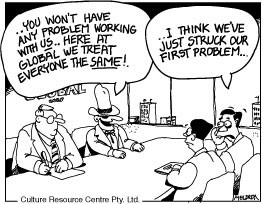 Greetings from snowy Sweden. I’m in the beautiful city of Gothenburg this week, working with therapists and administrators on implementing Feedback-Informed Treatment (FIT).
Greetings from snowy Sweden. I’m in the beautiful city of Gothenburg this week, working with therapists and administrators on implementing Feedback-Informed Treatment (FIT).
I’m always impressed by the dedication of those who attend the intensive workshops. More, I feel responsible for providing a training that not only results in mastery of the material, but also leads to better outcomes.
As commonsensical as it may seem to expect that training should foster better results, it’s not. Consider a recent study out of the United Kingdom. There, massive amounts of money have been spent over the last five years training clinicians to use cognitive behavioral therapy (CBT). The expenditure is part of a well-intentioned government program aimed at improving access to effective mental health services.
Anyway, in the study, clinicians participated in a year-long “high-intensity” course that included more than 300 hours of training, supervision, and practice—a tremendous investment of time, money, and resources. Competency in delivering CBT was assessed at regular intervals and shown to improve significantly throughout the training.
 The only problem? Training therapists in CBT did not result in better outcomes.
The only problem? Training therapists in CBT did not result in better outcomes.
While one might hope such findings would cause the researchers to rethink the training program, they chose instead to question whether “patient outcome should … be used as a metric of competence…” (p. 27). Said another way, doing treatment the right way was more important than whether it actually worked! One is left to wonder whether the researchers would have reached a similar conclusion had the study gone the other way. Most certainly, the headline would then have been, “Empirical Research Establishes Connection between Competence in CBT and Treatment Outcome!”
Attempts to improve the effectiveness of treatment via the creation of a psychological formulary—official lists of specific treatments for specific disorders—have persisted, and even intensified, despite consistent evidence that the methods clinicians use contribute little to outcome. Indeed, neither clinicians’ competence in conducting specific types of therapy nor adherence to evidence-based protocols have been “found to be related to patient outcome and indeed . . . estimates of their effects [are] very close to zero” (p. 207, Webb, DeRubeis, & Barber, 2010).
So, what gives?
There are two reasons why such efforts have failed:
- First, they do not focus on helping therapists develop the skills that account for the lion’s share of variability in treatment outcome.
Empathy, for example, has a greater impact than the combined effect sizes of therapist competence, adherence to protocol, specific ingredients within and differences between various treatment approaches. Still, most, like the present study, continue to focus on method.
- Second, they ignore the extensive scientific literature on expertise and expert performance.
Here, research has identified a universal set of processes, and step-by-step directions, anyone can follow to improve performance within a particular discipline. To improve, training must be highly individualized, focused on helping performers reach for objectives just beyond their current ability.
“Deliberate Practice,” as it has been termed, requires grit and determination. “Nobody is allowed to stagnate,” said one clinician when asked to describe what it was like to work at a clinic that had implemented the steps, adding, “Nobody is allowed to stay put in their comfort zone.” The therapist works at Stangehjelpa, a community mental health service located an hour north of Oslo, Norway.

 The director of the agency is psychologist, Birgit Valla (left), author of visionary book, Further: How Mental Services Can Be Better. Birgit is on a mission to improve outcomes—not by dictating the methods staff are allowed to use but by focusing on their individual development.
The director of the agency is psychologist, Birgit Valla (left), author of visionary book, Further: How Mental Services Can Be Better. Birgit is on a mission to improve outcomes—not by dictating the methods staff are allowed to use but by focusing on their individual development.
It starts with measuring outcomes. All therapists at Stangehjelpa know exactly how effective they are and, more importantly, when they are not helpful. “It’s not about the measures,” Birgit is quick to point out, “It´s about the therapist, and how the service can support that therapist getting better.” She continues, “It´s like if you want improve your time in the 100 meter race, you need a stopwatch. It would be absurd to think, however, that the stopwatch is responsible for running faster. Rather, it’s how one chooses to practice in relation to the results.”
Recently, researcher Siri Vikrem Austdal interviewed staff members at the clinic about their experience applying deliberate practice in their work. Says one, ““It is strenuous. You are expected to deliver all the time. But being part of a team that dare to have new thoughts, and that wants something, is really exciting. I need it, or I would grow tired. It is demanding, but then there is that feeling we experience when we have climbed a mountain top. Then it is all worthwhile. It is incredibly fun to make new discoveries and experience mastery.”
So, what exactly are they doing at Stangehjelp?
You can read the entire report here (Norwegian), or the abbreviated version here (English). Why not join Birgit this summer at the FIT Professional Development training in Chicago, Illinois. Together with Dr. Daryl Chow, we will teach participants how to incorporate deliberate practice into an individualized, evidence-based plan for continuous professional development. Click on the icon below to reserve your spot now.
Scott
Scott D. Miller, Ph.D.
Director, International Center for Clinical Excellence


I was fascinated to discover that “videre” in Norse means “further” while in Latin it translates to “to see”.
Hi Scott,
Do you know of any reactions from therapists in the UK? That is, apart from the British Association for Behavioral and Cognitive Therapies, they had a field day. I am asking because the IATP program recently has been hailed in the press without any questions here in the Netherlands. Also, a conference was held with lectures and a petition was given to the State Secretary of Health (https://www.vgct.nl/therapiewinst). Under the flag of ‘bring therapy to the masses, every euro invested in mental health care gives a gain of double the amount’, the advantages of CBT and EMDR were put in the spotlight with slick Powerpoint-presentations. The reaction of the State Secretary: ‘it’s a very clear and logical story’. He was quoted saying that it was ‘high time to expand education’. Who were behind this ? The Dutch Association of Cognitive-Behavior Therapy, a patient organization and six (!) professors in Mental Health. Also, an organization that represents the interests of 36.000 psychologists, psychotherapists and pedagogues.
There was no critique, not even a reflection on how the program has been received in the UK. No mention of the study by Branson et al that you are citing above. I wonder if these therapists know what’s in store for them if these plans are disseminated in the Netherlands. Of course, many of them could start a second career as teachers and supervisors in CBT and EMDR. EMDR has already been monopolized by a single organization. The show must go on!
This article by Barry McInnes from Brighton, England gives a lot of details on the successes and failures of IAPT.
http://therapymeetsnumbers.com/iapt-2018-why-do-less-than-1-in-5-referrals-reach-recovery/#comment-135
Cheers, Peter